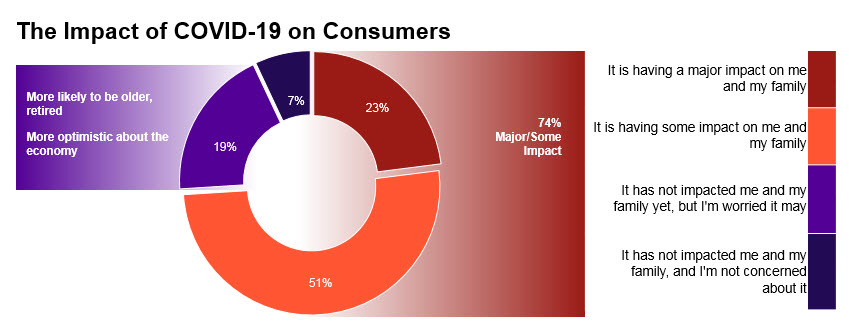
Escalent is actively conducting research across our industries to better understand consumers’ feelings and thoughts on and reactions to everything from making purchases to safely staying at home in this extraordinary time.
In one of our recent studies on the topic, we examined the consumer impact as well as what people like you and me are thinking about on the economic impact, purchase considerations and any shifts in mobility patterns. Within the Technology and Telecommunications sectors, each of these items is incredibly relevant as we help our clients understand the pandemic’s effect on products, services and connectivity.
We first examined how consumers feel the coronavirus is affecting their lives. As you may expect, three in four (74%) Americans feel that the virus is having either some or a major impact on them and their family. This feeling cuts across all demographics—and those who say they feel a major impact are also more likely to be financially impacted (three in four are taking a financial hit). It will be interesting to see how this perspective shifts as businesses (and their employees) begin to access funding from the economic stimulus package.

How does all of this uncertainty affect technology and connectivity purchases? We expect consumers to be more careful with what they purchase, with an eye toward easing their current situation. They will seek to save money until they determine how large of an impact the virus will have on their own personal bank accounts. Tech companies that can offer ways to make working from home more productive are in a good position to attract consumers as more people continue to work virtually.
Device manufacturers may want to shift their focus to showcase products that can keep kids busy while parents are trying to work—all while sharing the home. Devices and services that promote video sharing may be in higher demand as grandparents shelter away from their grandkids. Services like Zoom are exploding in popularity and devices like Facebook Portal are flying off the “shelves”—and in some cases, completely selling out.
Gaming devices may see a boost as parents seek ways to keep their children occupied. Smartphones, tablets and laptops may be in greater demand as busy families attempt to get each person in the household his or her own device for work and school. When work ends for the day, families are turning to devices and connections to keep in touch with friends and extended family.
The crisis hit the production of smartphones, tablets, wearables and laptops in late Q4 2019—with the pandemic hitting China first in December and impacting device production facilities there throughout Q1 2020. Additionally, in March, India began to cease production of devices and components and send workers home.
According to ABI Research, this international production hit will impact 5G-enabled devices the most. With Apple set to launch its first 5G devices in September, analysts were expecting 5G smartphones to begin to reduce in price as more manufacturers crowded the market throughout the year. The idea was that prices would even out by Apple’s 2020 launch. However, with the major disruption to production, there is a high probability that prices will remain high for 5G devices throughout 2020, which will affect adoption rates.
The devices thought to be least economically impacted are gaming consoles (according to Trendline), as manufacturers produced most of the newer devices in Q4 2019 (and prior to the pandemic). This timing is normal, as these manufacturers had geared up for the holiday purchasing season. Also, with tech giants like Amazon finally getting into the video games space, this will definitely boost not only gaming device sales but the purchases of highly promoted video games. At its very basis, video gaming encourages connecting with others, which goes hand in hand with navigating the coronavirus as competitors team up to take down alien worlds.
In terms of providing connectivity for all of these devices, Business Insider predicts that 5G networks will be built more quickly in order to provide faster connection speeds to homes both urban and rural. With more bandwidth available, it is expected that people and city governments will adopt the technology more quickly to gain access to these lightning-fast speeds as quickly as possible. As telehealth and IoT both continue to be adopted across healthcare and within cities, bandwidth needs will accelerate and demand for 5G connectivity will surge—especially if the pandemic lasts longer than one or two quarters. In addition, don’t forget about those necessary speeds and bandwidth needs in crowded homes where work and schooling are all taking place simultaneously.
The net effect of all of this is that consumers will spend their dollars more wisely and carefully in the months to come. Consumers will spend on technology and connectivity that fuel their lives in this “new normal” state. Prior to the pandemic, the economy was bustling along nicely with low unemployment rates and increased discretionary spending. That reality has shifted with this ongoing health crisis.
As consumers experience the realities of what this pandemic has brought forth, it will become imperative to use technology and connectivity in ways that will keep us all productive. Tech and connectivity companies can be the heroes that keep workers effectively working, kids busy and engaged in online schoolwork, and everyone in the household connected so that all can continue to advance in careers and classwork.
If you have questions on how the coronavirus is affecting your company and your customers, please send us a note. We are conducting research every day for our clients so that they can stay ahead of this crisis—and we’d love to do the same for you.








